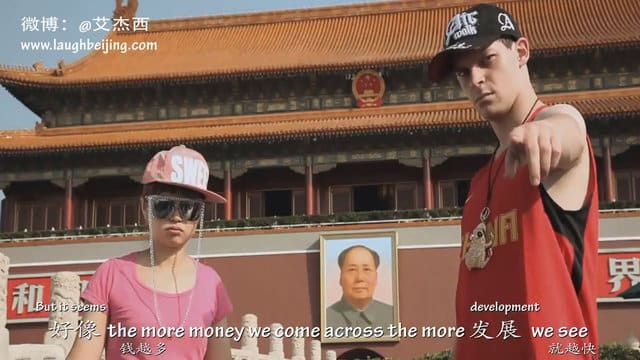As I study and perform more comedy in Chinese, sometimes I notice my sense of humor beginning to reflect the unusual nature of my experience—spending my time in a country and culture other than that of my birth and upbringing. When I make comedy, it is as much of a chance to learn about myself as it is to make others laugh.
Last year, I made a video called Laowai Style, in an attempt to bridge the cultural gap between China and the West through humor. I wanted to make a video that would be appealing to Chinese people and that they could understand. This meant meeting China where it was, not where I wished it to be, and as such, I included jokes about Westerners being able to use chopsticks, and similar themes.
Of course, any foreigner who has spent more than a week in China knows how to use chopsticks, and the lingering impression that we can’t use them is actually an unusually touchy subject. Even if we couldn’t use them when we came, wouldn’t we learn, or else starve?
Some foreigners took the joke about being able to “eat Chinese food without a spoon” as a tacit endorsement of certain Chinese people’s ideas that foreigners are forever unable to learn the most rudimentary elements of Chinese life. My Chinese friends, when presented with this view, saw things differently. No restaurant owner is trying to insult customers by handing them spoons—they are just trying to provide great service by covering all the bases. For me, including the line in the final piece was accepting this point of view, and putting aside my own concept of how China “should” be.
In my new video, I tried a bit of a reversal. This one is called Mo Money, Mo Fazhan (Development), and it was an experiment in mixing China and the West not in the way that most people experience the two cultures, but in the way I experience it. For instance, in the song I sing:
“Then we’ve got my gemenr (Bro) Deng Xiaoping
The man was Yi Mi Wu (4’11’) of ice cold bling.”
This jumbles east, west, and the two comedic sentiments of the cultures together. Chinese people think it’s funny that Deng Xiaoping, a Chairman of the Party, could be called a “Bro” and have his short stature casually mentioned in a song. Westerners love the ridiculousness of the rhyme and image behind Deng Xiaoping/ice cold bling. But myself, and a growing cohort of Chinese and Westerners who have experienced each other’s cultures, got both sides.
Last month, I performed Mo Money Mo Fazhan in New York, for a group of Chinese students at a show I organized at NYU. While the students loved “Laowai Style”, they told me they were more interested in Mo Money Mo Fazhan. After all, there are many foreigners who pitch down the middle in China and make jokes about chopsticks. But these students, Chinese who live abroad and understand Western culture… there is nobody making comedy for them. Chinese media on the whole is still so concerned about reaching the hundreds of millions of people in the developing parts of China there is little energy devoted to niche markets, and the media sphere tends to be hierarchical to the extent that the day-to-day decision-makers in state-owned television are not a part of the global world in the way these students are. These students are, as I am, odd ducks.
Having finished my Fulbright research and trying to make a living now as an independent intercultural comedian, I am realizing that the market will likely never reward such intercultural comedy as richly—with both money and attention—as comedy designed to appeal to the masses. But in making such pieces, I have managed to find in my audience members a group of kindred spirits. Whether they are Westerners like myself who have found that their lives interconnect with China, or Chinese students who have spent time abroad, I have found amazing friends who exist between cultures, and making them laugh while being myself makes me incredibly happy.


